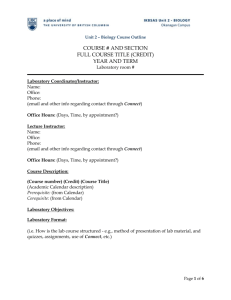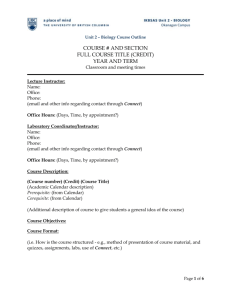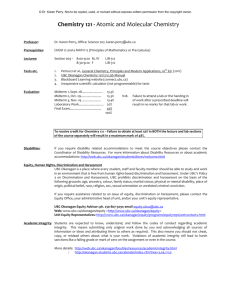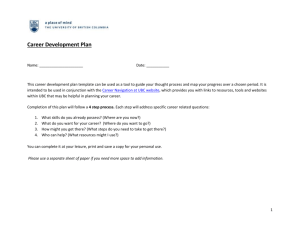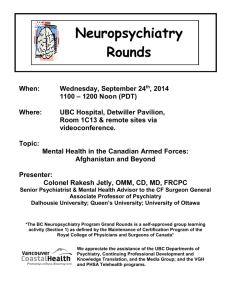BIOL 200, section 002 Cell Biology (3 credits) 2013W T1
advertisement
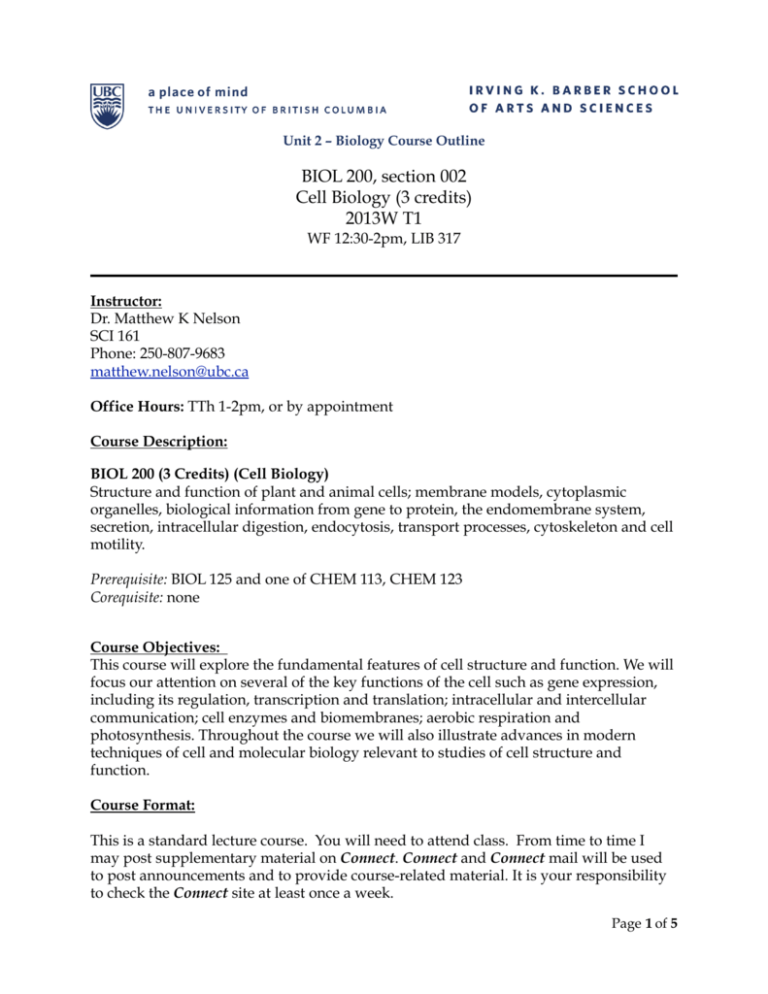
Unit 2 – Biology Course Outline BIOL 200, section 002 Cell Biology (3 credits) 2013W T1 WF 12:30-2pm, LIB 317 Instructor: Dr. Matthew K Nelson SCI 161 Phone: 250-807-9683 matthew.nelson@ubc.ca Office Hours: TTh 1-2pm, or by appointment Course Description: BIOL 200 (3 Credits) (Cell Biology) Structure and function of plant and animal cells; membrane models, cytoplasmic organelles, biological information from gene to protein, the endomembrane system, secretion, intracellular digestion, endocytosis, transport processes, cytoskeleton and cell motility. Prerequisite: BIOL 125 and one of CHEM 113, CHEM 123 Corequisite: none Course Objectives: This course will explore the fundamental features of cell structure and function. We will focus our attention on several of the key functions of the cell such as gene expression, including its regulation, transcription and translation; intracellular and intercellular communication; cell enzymes and biomembranes; aerobic respiration and photosynthesis. Throughout the course we will also illustrate advances in modern techniques of cell and molecular biology relevant to studies of cell structure and function. Course Format: This is a standard lecture course. You will need to attend class. From time to time I may post supplementary material on Connect. Connect and Connect mail will be used to post announcements and to provide course-related material. It is your responsibility to check the Connect site at least once a week. Page 1 of 5 Unit 2 – Biology Course Outline Copyright disclaimer: Diagrams and figures included in lecture presentations adhere to Copyright Guidelines for UBC Faculty, Staff and Students http://copyright.ubc.ca/ requirements/copyright-guidelines/ and UBC Fair Dealing Requirements for Faculty and Staff http://copyright.ubc.ca/requirements/fair-dealing/. Some of these figures and images are subject to copyright and will not be posted to Connect. All material uploaded to Connect that contain diagrams and figures are used with permission of the publisher; are in the public domain; are licensed by Creative Commons; meet the permitted terms of use of UBC’s library license agreements for electronic items; and/or adhere to the UBC Fair Dealing Requirements for Faculty and Staff. Access to the Connect course site is limited to students currently registered in this course. Under no circumstance are students permitted to provide any other person with means to access this material. Anyone violating these restrictions may be subject to legal action. Permission to electronically record any course materials must be granted by the instructor. Distribution of this material to a third party is forbidden. Required Materials: Cell and Molecular Biology, G. Karp, 6th or 7th edition. Both the hardcover and ‘binder-ready’ versions of the textbook are available at the bookstore. Course Evaluation: Midterm #1 Midterm #2 Final Total 30% Fri, OCT 4 30% Fri, NOV 8 40% FRI, DEC 6, 9am 100% Final grades will be based on the evaluations listed above and the final grade will be assigned according to the standardized grading system outlined in the UBC Okanagan Calendar. Note: Any requests for changes to final exams must be sent to the office of the Associate Dean of Students (bsasdeansoffice.ubco@ubc.ca). Page 2 of 5 Unit 2 – Biology Course Outline Missed Assignments and Exams: From UBC Okanagan Academic Calendar/Policies and Regulations/Academic Concession “Students who, because of unforeseen events, are absent during the term and are unable to complete tests or other graded work, should normally discuss with their instructors how they can make up for missed work, according to written guidelines given to them at the start of the course. Instructors are not required to make allowance for any missed test or incomplete work that is not satisfactorily accounted for. If ill health is an issue, students are encouraged to seek attention from a health professional. Campus Health and Counselling will normally provide documentation only to students who have been seen previously at these offices for treatment or counselling specific to conditions associated with their academic difficulties. Students who feel that requests for consideration have not been dealt with fairly by their instructors may take their concerns to [Dr. Joyce Boon, Unit Head, Biology]." 1. If a student is unable to write the mid-term examination, has an acceptable and appropriately documented reason, and informs the instructor before the examination is written by the class, the student will be accommodated. You may notify by e-mail (matthew.nelson@ubc.ca). A make-up exam must be arranged and written within seven days of the missed exam. Failure to notify prior to the examination will result in zero mark for this examination. 2. All students who miss or plan to miss a regularly scheduled final examination should go to the office of the Associate Dean, Curriculum and Students. Lecture Outline: TARGET WEEK MATERIAL Week 1-2: Chapter 1. Introduction to Cell and Molecular Biology Week 2-3: Chapter 2. Chemical basis of life Week 3-4: Chapter 3. Bioenergetics, Enzymes, and Metabolism Week 4-5: Chapter 4. The Structure and Function of the Plasma Membrane Week 5: MIDTERM 1 Week 5-6: Chapter 5. Aerobic Respiration and the Mitochondrion Week 6-7: Chapter 6. Photosynthesis and the Chloroplast Page 3 of 5 Unit 2 – Biology Course Outline TARGET WEEK MATERIAL Week 7-8: Chapter 7. Interactions Between Cells and Their Environment Week 8-9: Chapter 8. Cytoplasmic Membrane Systems: Structure, Function, and Membrane Trafficking Week 9-10: Chapter 9. The Cytoskeleton and Cell Motility Week 10: MIDTERM 2 Week 11: Chapter 14. Cellular reproduction Week 11-12: Chapter 10. The Nature of the Gene and the Genome Week 12-13: Chapter 13. DNA Replication and Repair Exam Period: FINAL EXAM Academic Integrity: The academic enterprise is founded on honesty, civility, and integrity. As members of this enterprise, all students are expected to know, understand, and follow the codes of conduct regarding academic integrity. At the most basic level, this means submitting only original work done by you and acknowledging all sources of information or ideas and attributing them to others as required. This also means you should not cheat, copy, or mislead others about what is your work. Violations of academic integrity (i.e., misconduct) lead to the break down of the academic enterprise, and therefore serious consequences arise and harsh sanctions are imposed. For example, incidences of plagiarism or cheating may result in a mark of zero on the assignment or exam and more serious consequences may apply if the matter is referred to the President’s Advisory Committee on Student Discipline. Careful records are kept in order to monitor and prevent recurrences. A more detailed description of academic integrity, including the policies and procedures, may be found at: http://okanagan.students.ubc.ca/calendar/index.cfm?tree=3,54,111,0 If you have any questions about how academic integrity applies to this course, please consult with your professor. Page 4 of 5 Unit 2 – Biology Course Outline Disability Assistance: If you require disability-related accommodations to meet the course objectives, please contact the Coordinator of Disability Resources located in the Student Development and Advising area in the University Centre building. For more information about Disability Resources or academic accommodations, please visit the website at: http://www.ubc.ca/okanagan/students/drc/welcome.html Equity, Human Rights, Discrimination and Harassment: UBC Okanagan is a place where every student, staff and faculty member should be able to study and work in an environment that is free from human rights-based discrimination and harassment. Under UBC’s Policy 3 on Discrimination and Harassment, UBC prohibits discrimination and harassment on the basis of the following grounds: age, ancestry, colour, family status, marital status, physical or mental disability, place of origin, political belief, race, religion, sex, sexual orientation or unrelated criminal conviction. If you require assistance related to an issue of equity, discrimination or harassment, please contact the Equity Office or your administrative head of unit. UBC Okanagan Equity Advisor: ph. 250-807-9291; email equity.ubco@ubc.ca Web: www.ubc.ca/okanagan/equity Unit Equity Representatives: http://www.ubc.ca/okanagan/equity/programs/ equityreps/unitcontacts.html Page 5 of 5

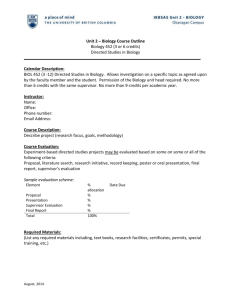


![July 31 Connect eupdate DRAFT [1]](http://s3.studylib.net/store/data/008100166_1-21bd0e395dcbfd67aaad5f18dd4ec08e-300x300.png)
